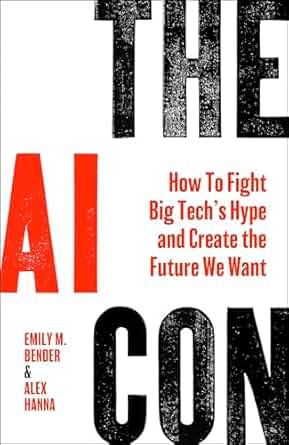The AI Con
If you want to understand big tech's obsession with AI, this book is a good start.

The world is awash in AI hype. It's refreshing to see a true critical look at the tech industry's obsession with AI. Of course there are the AI Doomers, but they hype AI just as much as the Boomers even as they worry about all these imaginary "existential risks". It is not just the tech industry's obsession that is worrying but also the complete lack of critical journalism and realistic legal guardrails that exist. The complete lack of ethics, accountability and consent, combined with the complete ignoring of current actual harms really creates a toxic cesspool. This book dives right into that pool and shines a bright light on all of it.
The book starts by defining AI hype and then goes into defining AI itself. The term itself has lost its meaning as it has been applied to all kinds of things. The book looks into all those arenas and explains how the different technologies work and explains why this search for the holy grail of AGI is really a farse based on eugenics.
In chapter 3 the book frames AI as a power struggle between workers and corporations. Chapter 4 talks about how AI is destroying the social safety net and degrading social services and education. Chapter 5 talks about AI's effects on creative fields and the rampant theft going on there. It covers not just AI's detrimental effects on art and music but also on journalism and science. Chapter 7 talks about Boomers and Doomers and how they both ignore the current harms of AI, and also how they promote a privileged, white and Western-centric view of the world.
The book is a lot of doom and gloom, but chapter 7 wraps up the book with strategies to combat the hype. A big part of that is asking questions. It has a lot of good suggestions, and first, I want to highlight one series of questions that works for any technology, not just AI.
Who does it harm?
What is the recourse for those who are harmed?
There are some other more AI-specific questions that are also good.
What data goes in?
What comes out?
How is this system evaluated?
How was it developed?
What was it trained on?
Where did that data come from?
Who did the training?
Contrary to what you may be thinking after reading my summary, you might think the book is 100% against AI and automation. The authors take great pains to point out some places where automation does make sense and is done in a responsible way. The authors are really against the hype and marketing and the harmful ways in which AI is currently being trained and deployed. We as a society need to be more critical and start asking more of these questions, and push back on all the hype.